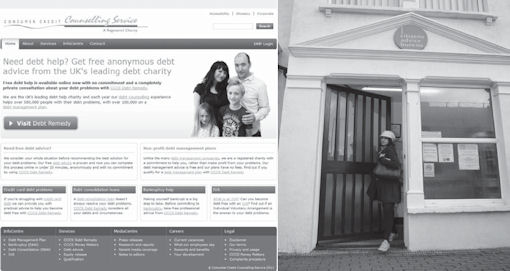5.3 Accessing debt products
A crucial factor in being able to access debt products is the credit standing of the borrower. People with poor ‘credit scores’, even if they have relatively high incomes, will have limited access to cheaper forms of debt. Most lenders ‘credit score’ loan applicants before releasing money. Although the exact practices vary from lender to lender, the credit score analysis can be broken down into four main areas:
- Factors which might automatically prevent approval: For example, if the individual has a County Court Judgement (CCJ) – or a decree in Scotland – against them for previously defaulting on debts.
- Affordability testing: This looks at the income and prevailing expenditure commitments of applicants, with an emphasis on existing debts.
- Characteristics of applicants: For example, how long someone has lived at their current address (and at previous addresses), and how long they have maintained their current banking arrangements will be scored. Frequent changes of address and banking arrangements attract unfavourable credit scoring.
- Security: This relates to the importance of security in deciding the level of risk and the interest rate.
The range of outcomes from this process is more than just a ‘yes’ or a ‘no’. It also determines the maximum the lender is prepared to advance and the interest rate charged. Moreover, it can involve the lender making use of the credit reference agencies (CRAs) that provide databases on the credit histories of individuals. Those seeking to borrow have the right both to ask if a CRA was employed by the lender and which CRA was used. For a small fee (£2 per file in 2010), anyone can ask to see their statutory credit report from the major CRAs (Experian, Equifax and Call Credit). For many households, the reality of the financial crisis at the end of the 2000s was that access to mortgages and other debt products became increasingly difficult to obtain. Lenders tightened up their ‘credit scoring’ processes and shunned more risky types of business. The latter could include those with a poor credit record and where inadequate security was being provided (for example, in the form of property value with respect to mortgages).
As part of any review process (such as Philip’s decision as to which debt product to use), it’s important to be able to tackle problems with debt if they arise. To where do people with debt problems turn if they get into difficulty? The nearest Citizens Advice Bureau (the local branch of Citizens Advice, whose research has been drawn on throughout this course) is one organisation which helps people with such problems. Other organisations include the National Debtline and the Consumer Credit Counselling Service. It can also be important to contact a lender and tell them about problems with repayment. Box 7 gives an example of the kind of tips for dealing with debt that are available from many organisations without charge – in this case from the OFT (2005).

Box 7 Money and credit: tips on debt
- Get free advice.
- Don’t panic or ignore the problem: unopened bills won’t go away.
- You can’t ignore your debts. Better to pay a small amount than nothing at all – those you owe money to may be prepared to accept low repayments.
- If struggling with store or credit cards, stop using them.
- Work out a realistic budget that covers all your income and spending. Check whether there are any benefits or tax credits you are entitled to that you are not getting.
- Decide which debts take priority – like mortgage or rent – and which cost you most through penalties or higher interest rates.
- Only agree to pay off debts at a rate that you can keep up – don’t offer more than you can afford.
- Contact those who you owe money to as soon as possible. Let them know that you are having problems. Many companies will be helpful if you talk to them.
- If organisations won’t accept your repayment offers, seek advice.
- If you get a threatening letter, get advice from your local Citizens Advice Bureau or trading standards service.
- If a debt collector calls at your home, you don’t have to let them in. If you want time to get advice arrange a later appointment. If a debt collector or lender harasses you contact your local Citizens Advice Bureau or trading standards service.
- Check if a loan will be secured on your home. If it is and you do not keep up repayments you could lose your home. If you do not understand the terms of a loan get advice.
- If you’re thinking of taking out a new loan to pay off debt, make sure you find out the total cost of the loan, not just the monthly repayments.
- Think very carefully before borrowing more to pay off your debts. Get impartial advice and don’t rush into signing anything you don’t understand.
- If you are thinking of using a fee-charging debt management company, then make sure you understand exactly what you are signing up to – check what fees you will be paying to a debt management company and how long it will take you to pay off your debts.
- Keep copies of all letters you send and receive about your debts.
(OFT, 2005)
